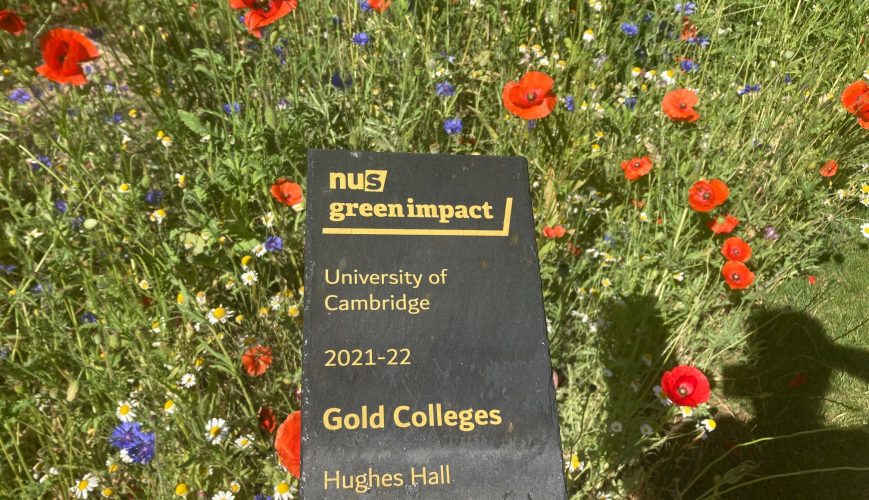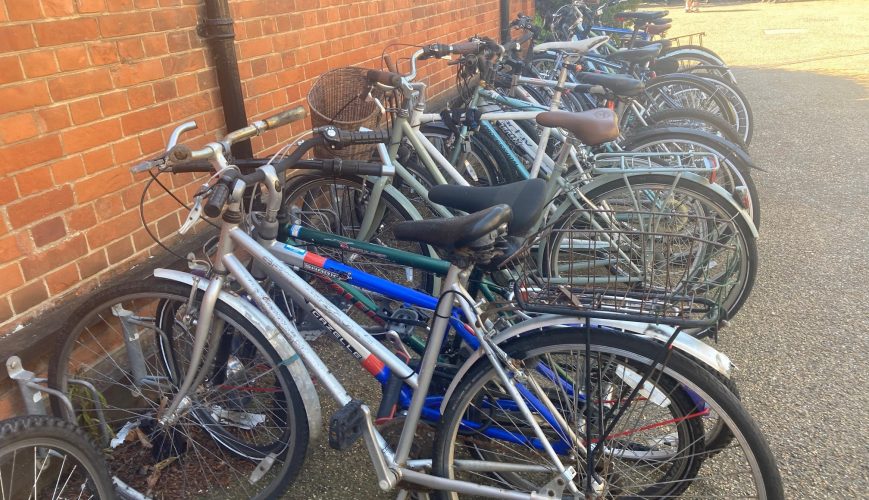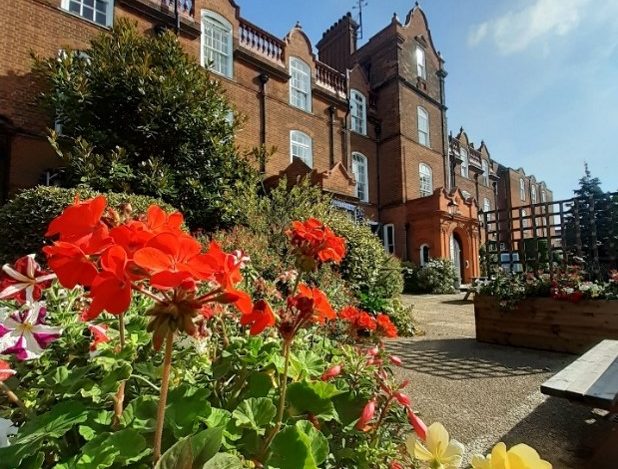Green Impact Award: GOLD for fourth year running
We are proud to have been awarded Gold by the NUS Green Impact Programme in 2020, 2021, 2022 and 2023.
Our efforts range from large-scale changes such as the installation of solar panels and a robust carbon reduction policy (aiming for carbon neutrality by 2030) to smaller scale initiatives including nesting boxes, wildlife tunnels through our fencing, and new composting provision. And, new for 2022 we have developed a wildflower meadow area, held a bicycle repair day with our students, and organised a number of environmental library displays.
The University of Cambridge Green Impact Scheme supports and encourages departments and colleges across the University in reducing their environmental impacts. The College was commended for questioning current policies, trialing new initiatives and working towards carbon neutral goals alongside Green Impact. They cited our exploration of sourcing recycled paper as a good example of comprehensively reviewing processes and procurement opportunities and noted that we are integrating sustainability into our everyday working practices across the College.
Green Impact auditors for 2021 commented: “Well done to everyone involved! This has been an exceptionally challenging year to say the least. Thank you on behalf of the University community for managing to prioritise sustainability progress in such a difficult year. It sounds like sustainability is fully embedded into Hughes Hall. We look forward to seeing the team aim for Platinum!”
More recently, 2022 auditors said: “The team have made great improvements and additions this year and are clearly integrating sustainable thinking in their everyday work.”
Jonathan Newby, Hughes Hall Bursar, said: “To win this award for the fourth year running is a great achievement and a real testament to the collaborative efforts of our whole community in maintaining a sustainable environment here at Hughes. We have a beautiful place of work, and study, so it’s rewarding that so many amongst us are dedicated to keeping it that way.”
Gardens and wildlife
Hughes Hall has wonderful lawns and gardens which we take good care of because we want them to be a haven for our community – and for local wildlife. We have spotted foxes, squirrels, hedgehogs and many different species of birds and insects in our grounds, and we continue to make efforts to welcome and support them. For example, we provide water for birds and hedgehogs, and have installed a ‘wildlife corridor’ in the boundary fences. We have installed swift boxes on our accommodation building, Wollaston Lodge, and these are now in use.
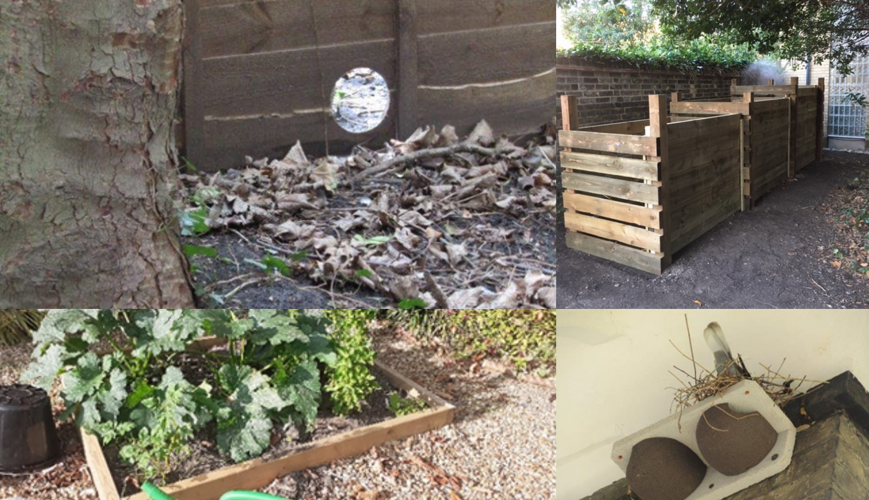
Our ongoing environmental initiatives include wildlife tunnels through boundary fences, composting, nesting boxes and student veggie patches.
We have constructed a new composting area for the College’s green and garden waste. We can now start to generate our own compost to use on site, and save on waste collection costs. Our students have even been growing vegetables in dedicated vegetable beds.
Operational sustainability
Energy
The College’s electricity provision is 100% renewable. We have installed solar panels on the roofs of Gresham Court and Fenner’s buildings. These are on a feed-in tariff, so that the power goes into the national grid if we are not using it ourselves. From October 2021 the main site will use a mix of Cambridgeshire solar energy, wind, and hydro power, and will be zero carbon. Our College houses, which have different energy arrangements until 2023, will then convert to using a bespoke power mix including Cambridgeshire solar energy rather than biomass, which will also be zero carbon.
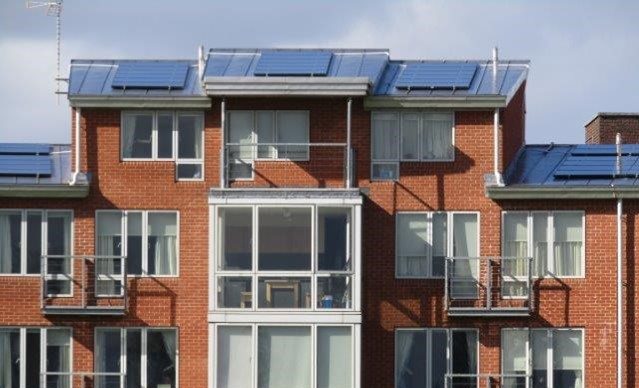
We have installed solar panels on the roofs of Gresham Court and Fenner’s which run on a feed-in tariff, so that the power goes into the national grid if unused
We are committed to making our older buildings more energy efficient. In the latest renovation of Margaret Wileman Building (built in 1895), measures such as draft proofing windows have been taken. Many of our light switches in public areas are controlled by motion sensors, so that they cannot be left on accidentally. In the Margaret Wileman Building, which is listed, the historic light switches in the corridors are retained as a decorative feature but the lights are automatic.
The College’s Carbon Reduction Policy is available under the College Policy Documents. We aim to be carbon neutral by 2030, and we are in the process of setting science-based targets for reduction.
Our gas is used for space and water heating, and in the kitchens. In order to achieve our zero carbon target, we will need to migrate the whole estate off gas. This will be a significant and costly change for the College and we are researching options.
Waste
We separate the waste into different bins: food waste, glass, mixed dry recycling, and general waste. Our waste collection contractor weighs it on collection and charges vary by type of waste. The waste is all collected, mixed, in the same lorry and taken to the processing plant, where it is mechanically separated into streams. Their recycling facility sorts and segregates mixed recycling with up to 100% recycling rates available.
Catering
The catering team is committed to sourcing food sustainably. At least 80% of fish is MCS certified sustainable. We are reducing the use of beef and lamb. We always provide vegetarian and vegan options, and we do not serve meat on Mondays.
We are dedicated to reducing plastic waste. Plastic containers are being phased out and will be replaced with 100% compostable alternatives. We sell reusable mugs, and give a discount on drinks served in Hall when they are used.
Transport
We encourage walking and cycling whenever possible. We are fortunate to be located off Mill Road, with easy access to the City Centre and local shops, and we are within walking distance of the station and the bus hub at Drummer Street.
The Maintenance and Porters teams assist where they can in encouraging green forms of transport, for example, with any bike repair issues and providing pumps. The maintenance team also assists students when they have lost their bike lock key or forgotten combinations by cutting old locks. At the end of the year we recycle abandoned bikes by offering them to new incoming students rather than them buying new ones or us having to skip them.
Investments
College’s investments are mostly managed by Cazenove, part of Schroders Group, which was recognised by NGO ShareAction as the number one European fund manager for responsible investment performance and transparency.
Further information
Our MCR student body provide a detailed guide for all students to share a commitment to sustainability and protecting our environment: Hughes-green-brochure-2021.pdf (cam.ac.uk) and our students run a Hughes Hall Green Impact Facebook group to encourage and promote more sustainable ways of life: www.facebook.com/HHGreenImpact/.
Hughes Hall also seeks to provide an academic environment to facilitate the study and research of strategies to tackle key global challenges such as climate change. This important work is brought together in our Centre for Climate Engagement which was established to increase awareness of climate change mitigation and adaptation on the boards of private companies, and the need for urgent action. See our CCE website page for more information or to get involved.


